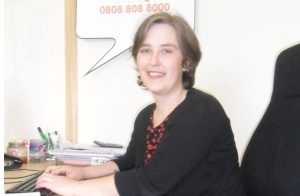Role: Area Manager
Company: Lifeline
Track Record:
What does your role involve?
Counselling charity Contact runs the regional 24/7 crisis Lifeline helpline service, a major project under the Protect Life Suicide Prevention Strategy.
There are two main aspects to the delivery of this service: the helpline part of the service, where any member of the public can get immediate support from fully qualified and experienced counsellors at any time. And then there’s the community-based follow-on therapeutic component, where people can access counselling in their own community, helping them address the issues that brought about the crisis in the first place.
It’s my job to ensure that we have counsellors/psychotherapists placed in all towns across the two Trust areas that I cover, ready to book clients in within seven days once they have been assessed through the Lifeline helpline. That’s the same for our clients right throughout the province as we have area managers for the Northern, Western and Belfast Trusts as well.
There’s also a publicity/communication dimension to my job. As well as raising awareness among the general public through various media channels, I need to ensure that other healthcare and community/voluntary professionals know how to refer people to us.
Making a referral to Lifeline couldn’t be more straightforward – it’s just a matter of phoning the freephone number 0808 808 8000 (Textphone 18001 0808 808 8000 for deaf and hard of hearing users).
How did you get into the position in the first place?
I have always had an interest in supporting people to overcome challenges in their lives. After eight years of working as a community worker, first in West Cork and then in Downpatrick as health development worker, I decided it was time to try something different so I made the move to working for Contact, or Contact Youth as it was then known. Initially my job involved managing a team of schools counsellors until I moved to the post of area manager in 2009.
Did you always want to work in this sector in some capacity?
Not always! I wanted to work in an organisation where I felt well supported and in turn could then be a support to others and I get this from Contact. Because of the nature of our work on Lifeline, and the level of distress of clients we work with every day, it’s essential that we all receive the best support possible.
What training or previous experience do you have that has helped you in your current role?
I have a background in community development, in particular in rural communities having done my Masters and worked in this area for over eight years. This gives me an understanding of the isolation that many people face practically in terms of accessing services close to home but also psychologically in terms of being able to access confidential support in times of need. I am currently in the process of completing a Masters in Counselling Practice at QUB and enjoy being able to contribute more to the clinical side of the work here at Contact.
What is your organisation’s role in the local community?
Our job is to make sure that people of any age can access timely and appropriate support at times of crisis, both over the phone and face to face in their community, no matter where they live across the region. Lifeline works in close partnership with statutory health and mental health providers as well as other community and voluntary groups to help get the best package of support in place for vulnerable people.
And how does your role fit in as part of this?
I also ensure that our counsellors are kept up to date with other supports available to Contact / Lifeline clients – counselling may be just one of many supports needed to get someone through a difficult time and they may need practical support, for example benefits, housing or peer support. It is important therefore that our therapists have a good idea of what these other supports are so that they can signpost or refer them on if necessary.
What sort of personality and qualities do you need to do your job successfully?
Because Lifeline is a relatively new service which is evolving all the time – it was established in 2008 – it’s important to be open to change and learning. Priorities can change from day to day, depending on what is happening in the communities where we work, so it’s important to be flexible in order to meet these needs, while also maintaining a solid core service.
What are the biggest rewards of the job? And the biggest challenges?
We receive feedback all the time about the great job that Lifeline does and it’s personally satisfying to be able to contribute to this. The greatest challenge is trying to reach the people who need Lifeline’s support most – those who are in the greatest despair but find it difficult to reach out to ask for help. That means men in general, who are three times more likely to die by suicide here in NI than women. Around 40 per cent of our clients are male, so we aim to increase calls from men of all ages to the service.
What advice would you give someone who wanted to do the same job?
Contact regularly recruits for staff, volunteers and locum therapists. Volunteering with us is a great way to get a feel for the work we do so I would really encourage people to keep an eye on our website for details of future recruitments.
What’s the best piece of advice you’ve ever been given?
Do what makes you happy – follow your bliss.
What do you enjoy doing outside work?
Spending time with my partner, catching up with family and friends, getting my hands dirty in the garden and enjoying the lovely countryside all keeps me on an even keel.


